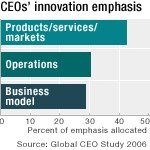
IBM and the Economist Intelligence Unit (EIU) conducted the study called "Expanding the Innovation Horizon, the 2006 IBM Global CEO Study which reported on the agenda of CEOs in the next few years. The results are based on interviews conducted recently with 765 chief executives from around the world. (It was the second global CEO study conducted by these partners; in 2004, the first Global CEO Study reported on interviews with 456 CEOs.)
Over the next two years, two-thirds of corporate CEOs say they're going to need to make fundamental changes to their business.
The reasons, they say, are many: intensified competition, escalating customer expectations, and unexpected market shifts. For many, you can add to that list workforce issues, technological advances, regulatory concerns, and globalization.
Yet fewer than half of CEOs think their organizations have handled such changes with much success in the past.
Some of study's findings are:
Over the next two years, two-thirds of corporate CEOs say they're going to need to make fundamental changes to their business.
The reasons, they say, are many: intensified competition, escalating customer expectations, and unexpected market shifts. For many, you can add to that list workforce issues, technological advances, regulatory concerns, and globalization.
Yet fewer than half of CEOs think their organizations have handled such changes with much success in the past.
Some of study's findings are:
Business model innovation is becoming the new strategic differentiator. "The business model we choose will determine the success or failure of our strategy," one study participant said. In contrast to the findings of the 2004 survey, innovation in the enterprise's business model garnered nearly as much attention as innovation in a company's core processes and functions.
Business model innovation can pay off. In the financial analysis for the study, companies that have grown their operating margins faster than their competitors were putting twice as much emphasis on business model innovation as underperformers
Innovation doesn't need a badge to get in. CEOs said their company's employees were the most significant source for innovative ideas. But ranking close behind employees were business partners and customers—indicating that two out of the three top sources for the best ideas now lie outside the enterprise.
Collaboration can pay off. The financial analysis explains why CEOs are more eager to partner and engage with other organizations than ever before. Companies with higher revenue growth reported using external sources significantly more than the slower growers. As one CEO said: "If you think you have all the answers internally, you are wrong."
No comments:
Post a Comment